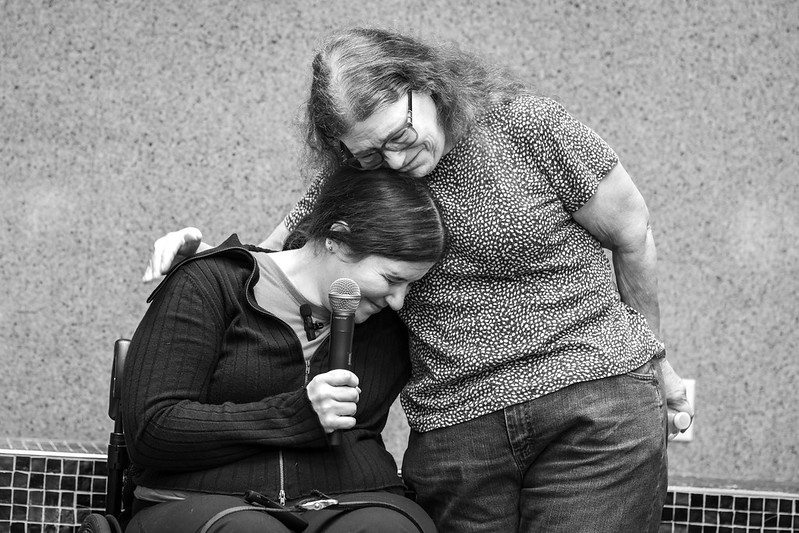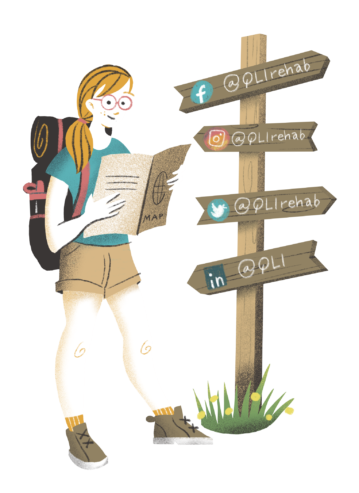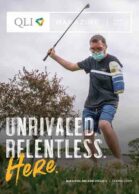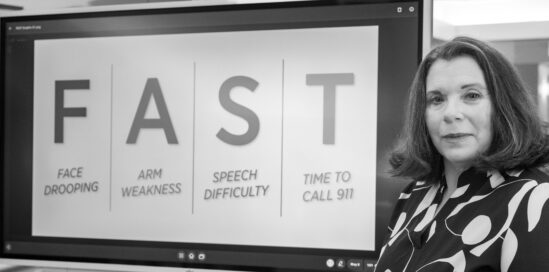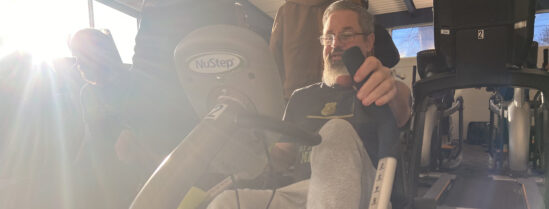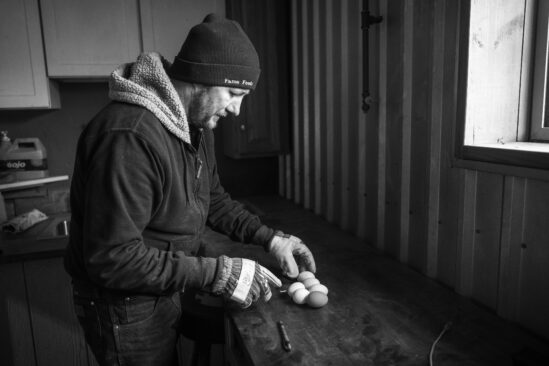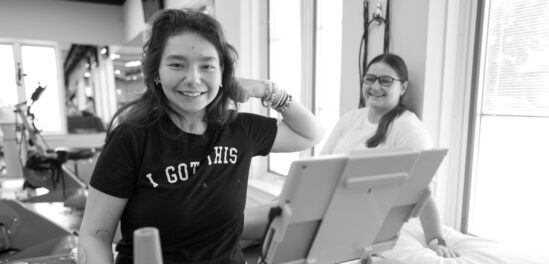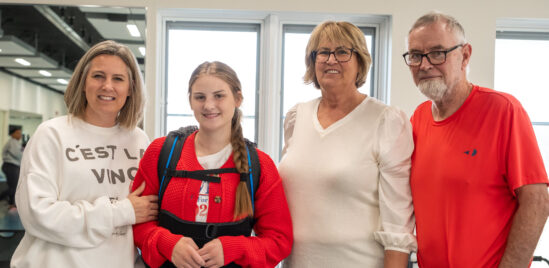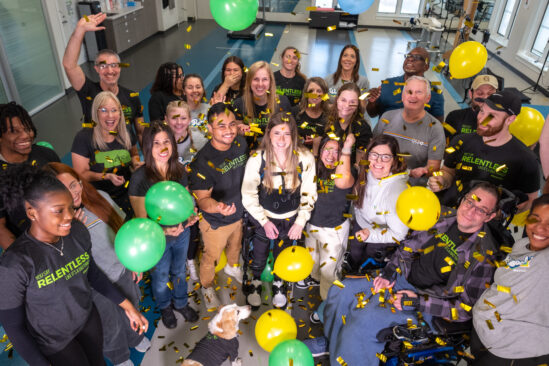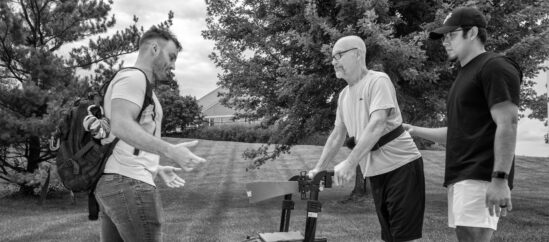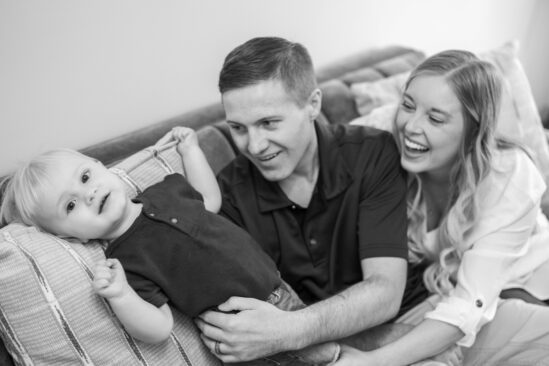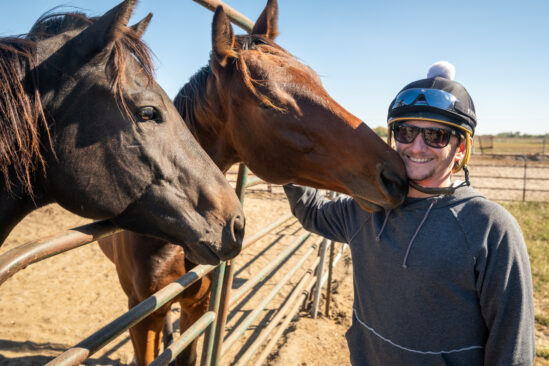The polymer is a chain of large molecules constantly in flux, moving around, repelling, attracting, and ultimately being able to come together and create new bonds, colors, and materials. The polymer is work—degrees of hard-fought concentration. So when it comes to studying these, Lynn Wolf can’t quite put her finger on when and where the intrigue was born.
The presentation is on the Vibe Board in the Colladay Center lobby, where the whole space is packed with QLI clients and team members. Lynn starts the story of her journey at the present—working as an engineering technician at 3M in Minneapolis. Her current focus is on creating polymers for solar cell panels. Polymers, in turn, bring her back to the interest and passion present ever since she was a kid—colors. In a backpack she carries a binder filled with colored patterns and designs she has created.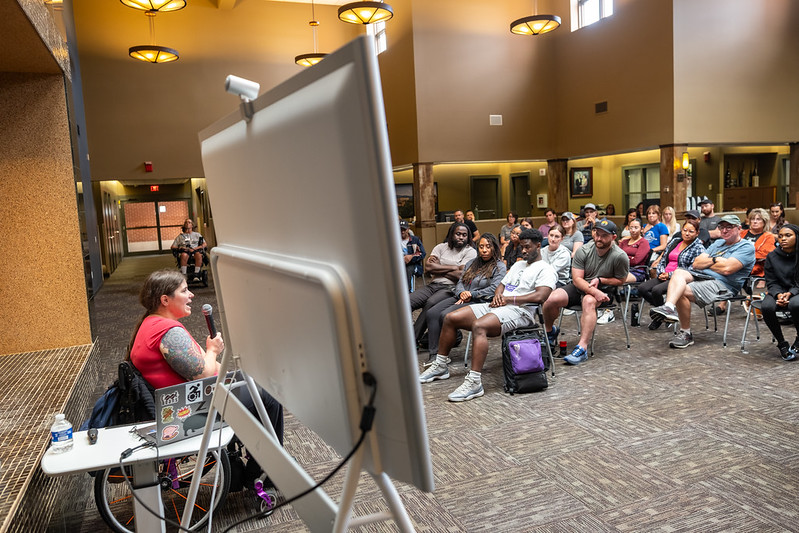
At the prompting of someone in the crowd, she rolls up the sleeve of her shirt to display a vibrant and colorful tattoo—an imprint and extension of her search for and living through joy in her life. But she’s not here at QLI to regale everyone present with tales of what she is doing but instead to tell all of who she is, where she has come from, and why everyone can find their way in spite of adversity. Nearly fifteen years prior, Lynn sustained a spinal cord injury and traumatic brain injury. Lynn, like many of her peers, was given a daunting prognosis—that any progress she would make, any physical or cognitive gain or the like, would only come within the year or two following injury.
Physical therapist Connor Davis raises his hand. “What do you think of health care professionals giving those kinds of prognoses to individuals after injury?”
Lynn, with a grin on her face, says in her trademark frank and direct way: “I think it’s a crock of shit.” The reality of a one to two-year window of maximum recovery capability is very much so outdated. Recovery is always in flux. It is malleable. It looks different from person to person. Because of the bedside manner she was met with, Lynn was in a very dark and despondent place, far from the joy she experienced with her lifelong friends just a short while before. It was March 2010, and Lynn was so close to the end of her master’s program in chemical engineering at Iowa State University. With a group of friends, she traveled to Arizona for a few days—a time to unwind and reorient herself before school resumed.
They went to the Grand Canyon first. “It was glorious,” Lynn remembers, smiling. “I’d recommend it to anyone.” The next day would be a jaunt up to a ski resort. “I was running late getting to the resort that morning,” she says. Lynn clearly remembers that drive, then getting prepared for skiing, and getting her gear in order. And then no further memory of the next seven weeks. Lynn did not remember her accident, skiing down a hill and hitting a tree, sustaining a traumatic brain and spinal cord injury. It proved a crucial matter of minutes and seconds. For Lynn, it was 37 minutes from when her injury 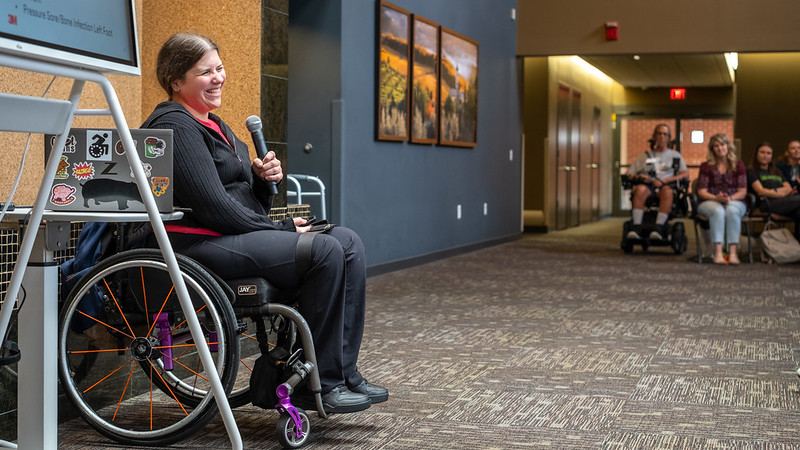 occurred to when she was having emergency surgery. There is little doubt in Lynn’s mind that the immensely quick transport to the hospital saved her life, and was able to control the extent of her injuries.
occurred to when she was having emergency surgery. There is little doubt in Lynn’s mind that the immensely quick transport to the hospital saved her life, and was able to control the extent of her injuries.
As Lynn began to regain awareness and understand her deficits, the mental blocks and walls came when she considered her injury, an inner narrative of can’t do. “Some might hear a doctor give bad news, and use it as fuel to try and prove them wrong, but that’s such a hard thing to get your mind around,” says Lynn. Viewing these prognoses as equally fostering optimism and pessimism, Lynn wishes that the narrative could change. “An ‘I’m not sure’ from a doctor is still tough to hear,” she notes, “but I think it’s a bit more honest.’”
Just as tough was reorienting her mind to her recovery. Fortunately, the mindset change was aided by Lynn’s positive first impressions of the QLI team.
“I could feel that everyone truly cared about me, even though I was a stranger to them at first. The initial questions were about who I was and what my goals were. I remember still being unsure about some of them, but I knew I wanted to eventually get back to grad school.” It was through those continued mindset changes that Lynn was able to fully realize her ability. It fully oriented herself to her recovery. One of the big hurdles, Lynn notes, that can affect anyone in the middle of recovery from injury is a comparison trap: a sense of despair or negative thoughts that arise when seeing peers with similar injury classifications “progressing” at faster rates than they are. Of course, recovery is not universal—similar injuries don’t mean that members of a peer group will reach certain benchmarks at the same time.
This was the core point of Lynn’s discussion with QLI clients and team members when she returned to campus in August 2024—to let everyone know that their journey is their own, not tied to someone else’s.
So what did Lynn do with her journey?
She returned to school, this time at the University of Minnesota. The groundwork had been set years before—with Lynn knowing that it could take a decent amount of time, and in 2015 she had completed her master’s degree in chemical engineering.
The intervening years have not been free from occasional hardship, with some medical setbacks, but Lynn has remained steadfast. At the core of her perpetual recovery has been her constant connection with her family, friends, and the broader community. “In a sense,” says Lynn, “the resilience that I have had in my recovery comes from my mom. She never told me that I couldn’t do certain things, or that I should never stop trying. When I told her I wanted to go back to engineering, she asked, ‘What’s stopping you?’ I didn’t think anyone would hire me. ‘But have you applied?’ she’d ask me. ‘Have you tried?’ She’ll always see my full potential.”
Through the connective community, Lynn found a fulfilling role with event security in the Twin Cities area, and in 2024 was accepted into her position at 3M. Even further, she has continued to make physical gains—joining an epidural stimulation trial in 2020, eventually able to get more return in her legs than before, over 10 years removed from her injury.
Every milestone met Lynn echoes from when her work at QLI became a platform and foundation for how she would live out her life. “It’s a recovery in a 360 degree-approach,” Lynn reflects, “incorporating every component of one’s life together so that every client can live and pursue a meaningful reality.”
